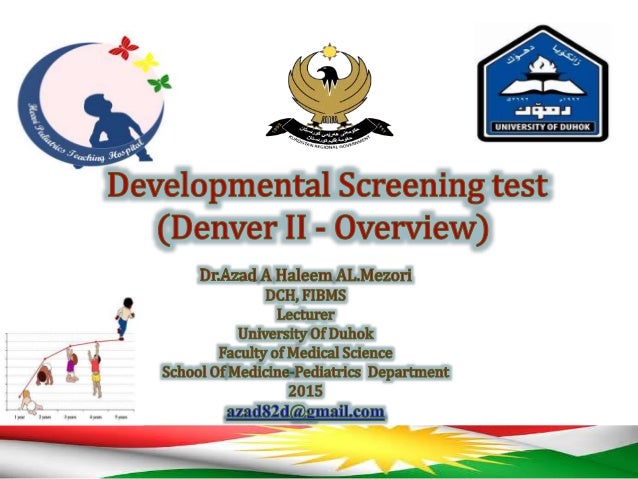Denver Developmental Screening Test Ii Pdf Files
Norms on the Denver Developmental Screening Test (DDST) developed in Denver, Metro-Manila, Tokyo, Okinawa, and the Netherlands were compared. In the 'rst phase, Denver II developmental screening test was applied to 583 children (305 girls and 278 boys, aged 3 months to 6 years, mean=3,5 years) who visited family physicians or other health.
Links with this icon indicate that you are leaving the CDC website. • The Centers for Disease Control and Prevention (CDC) cannot attest to the accuracy of a non-federal website. • Linking to a non-federal website does not constitute an endorsement by CDC or any of its employees of the sponsors or the information and products presented on the website. • You will be subject to the destination website's privacy policy when you follow the link. • CDC is not responsible for Section 508 compliance (accessibility) on other federal or private website. For more information on CDC's web notification policies, see.
Biblioteka p cadillac. Developmental Screening Tools Includes: (Ages and Stages Questionnaire), (DDST-II), (ESI-R), (Infant Toddler Developmental Assessment), (Hawaii Early Learning Profile),, (Assessment Evaluation & Programming System), (Preschool Language Scale),,,. - A new measure called PEDS:Developmental Milestones (PEDS:DM) for children 0 - 8 years is now available for parents and professionals.
The Screening Level version is in wide use by pediatricians but the PEDS:DM also has an Assessment Level version helpful for child-find, early intervention programs, and NICU follow-up. Tools recommended by the American Academy of Pediatrics,. For all other tools,.
Ages and Stages Questionnaire (ASQ) Diane Bricker, Ph.D. & Jane Squires, Ph.D. Type: Developmental screening, 4-60 months What is the purpose of this tool? To screen for developmental delays in the first 5 years of life. It covers 5 developmental areas: communication, gross motor, fine motor, problem solving, and personal-social. What is its appropriate use?
First-level comprehensive screening for developmental delays; monitoring the development of children considered 'at risk' for developmental disability or delay resulting from medical or environmental factors. It may also be used to communicate to parents the stages of child development and the capabilities of their child. What are the components? It includes 30-item questionnaires completed by the parent or caregiver at specific ages. The first questionnaire is completed when child is 4 months old and the last at 60 months of age. To each developmental item parent responds 'yes', 'sometimes', or 'not yet'. Professionals convert items to point values and compute total scores.
Available in Spanish. Who can administer the scale? Test na vnimateljnostj shuljte onlajn 1. It can be completed by parent self-report or by individual interview.
Administration and scoring instructions come with scale set. How long does it take to administer?
Approximately 10-20 minutes for parent response. Is there information on reliability and validity?
Overall agreement on children's developmental classifications was 83% between the ASQ and professionally administered developmental scales, with a range of 76% to 91% agreement. Test-retest reliability was over 90% at a 2 to 3-week interval, and agreement of parents with trained examiners also exceeded 90% [1]. What are the advantages of this tool? It is a low-cost method of doing periodic screening; it takes advantage of parental knowledge of the child; it can be adapted to a variety of environments. What are the disadvantages? It depends solely on parent report. Where can I find more information?

Denver Developmental Screening Test II (DDST-II) William K. Frankenburg & Josiah B. Dodds Type: Developmental screening, 1 month - 6 years What is the purpose of this tool? To screen children from 1 month to 6 years of age for possible developmental problems, to confirm suspected problems with an objective measure, to monitor children at risk for developmental problems.